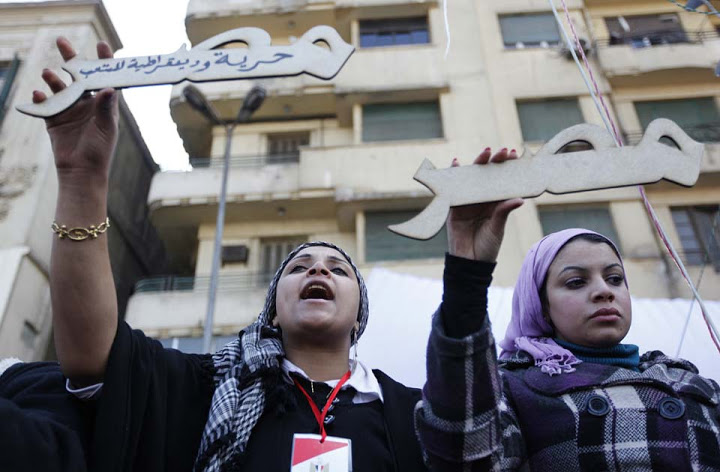
There is no doubt that if Egyptians were to apply genuine democracy and true Islamic values, we would become a better and more productive society. In reality, democracy advocates do not really want to abide by the full application of democracy, while those who defend Islam are far removed from the true moral values of Islam. Furthermore, the latter know nothing about true democracy, and have no interest in; they simply use it to strengthen Egypt as an Islamic State.
Revolution can bring out either the best or the worst in any given society, with both scenarios occurring during the Egyptian revolution. The advent of the revolution brought out the best in each Egyptian citizen. Although nothing was planned in advance, organization in Tahrir Square was perfect, with each protestor willing to contribute to the good of the country and to the common goal of obtaining freedom, dignity and justice for all Egyptians. Egos were diminished in Tahrir Square; our national needs were more important than our personal interests. During the first 18 days, the revolution managed to bring out the best in people, to the extent that protestors dubbed Tahrir Square, ‘Utopia City.’
With time, however, the united attitude of Egyptians declined, until society was eventually split between citizens who promoted the principles of Islam and others who advocated for democracy, each side convinced that its mission would survive and flourish. However, both groups failed to add value to the genuine principles of Islam and the true mechanisms of democracy; on the contrary, both ideals were harmed. Credit for this goes to the Supreme Council of the Armed Forces (SCAF), ruling Egypt during the transitional period.
Prior to the revolution, democracy was not only a dream for the majority of Egyptians, it was a concept they knew little about. However, some drew a correlation between prosperous nations and their application of democracy, believing that if Egypt were to follow the same path, its economic problems would be resolved. In addition, since Islam was not deeply involved in politics – not as it is now – people enjoyed practicing their beliefs, without involving Islam in the political struggle.
Egyptians who want to establish a civil state based on pure democratic principles should recognize President Mohamed Morsi’s legitimacy, and accept the fact that he will continue to be the president of Egypt for a full term of four years. On the other hand, President Morsi must work within the framework of his legitimate mandate. Extending his power beyond the new constitution will lead to questioning the legitimacy of his authority and decrees.
Democracy, in essence, is a mechanism of ‘checks and balances’ that helps nations prosper and affords citizens free expression. In democratic countries, numerous structures are in place, all with the common aim of applying genuine democracy. Most of these structures were established based on political history, cultural dynamics, perhaps past political conflicts, as well as other factors. The means often vary, but the end is the same, in most countries. Egypt needs to develop its own structure, one that is based on its own influential factors.
Islam is known for the moral values it promotes; including equality, forgiveness, justice, tolerance and trustworthiness. Nevertheless, political Islamists are far removed from this basic Islamic compassion. In their attempt to involve Islam in the political scene, political Islamists tend to apply values that oppose those of their religion: gender and religion discrimination, lying for political gain, conveying a message of hatred to those who oppose them and unreliability when it comes to honoring their agreements and accords. It is also known that Islam as a religion encourages leadership by people who posses merit and who are trustworthy; it does not endorse blind obedience of a leader’s instructions, as is the case with the current ruling party.
Bringing the political debate and struggle into the mosques has also negatively affected Islam, leading to the outbreak of fights among Muslims following Friday prayers. It has since escalated to the point of an Islamic preacher being held hostage inside his mosque for over 12 hours after delivering a politicized Friday sermon, guiding voters prior to the constitutional referendum. This kind of political involvement inside mosques has had an adverse effect on Islam.
Egyptian authorities and politicians have their own way of defining the democratic mechanism and Islamic values, a definition designed to enhance their own political status and serve their political interests rather than abide by the genuine principles of both democracy and Islam. Since Egypt is still building the pillars of its democracy, each politician has, in order to obtain personal gains, attempted to impose his individual political understanding on an entire society.
The correct application of democracy and Islam requires a well-educated and politically mature society. This will evolve with time, and not by force. Egyptian society is in dire need of a functional democracy and genuine Islamic values, based on a correct understanding of the dynamics of each, and a complete separation between the two. Egypt will progress faster and better standing on two legs (democracy and Islam); by crossing legs, however, we are certain to fall down.
Mohammed Nosseir is member of the political bureau of the Free Egyptians Party that was established to promote liberal democracy in Egypt.
Photo: AP
Image: Egypt%20AP.jpg
